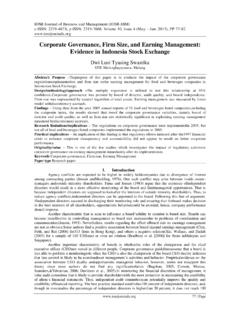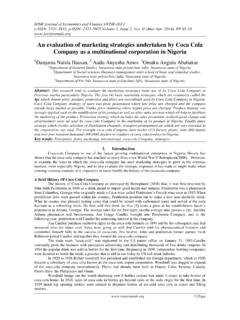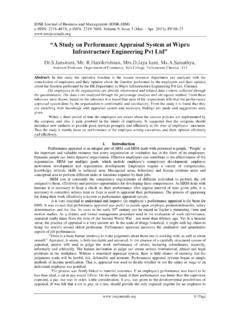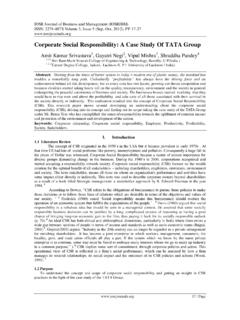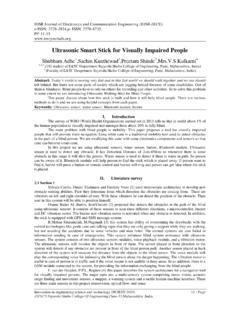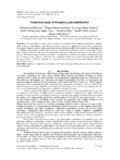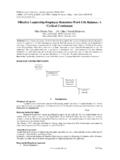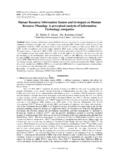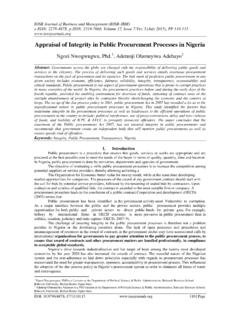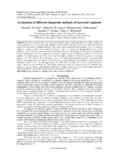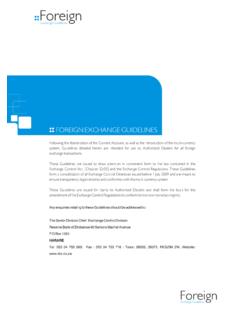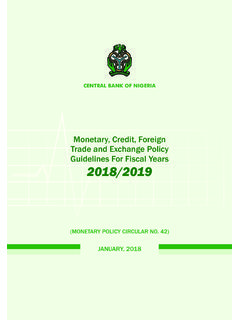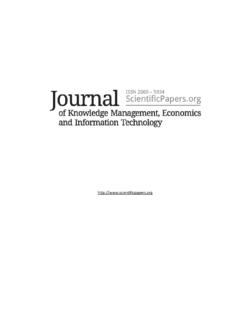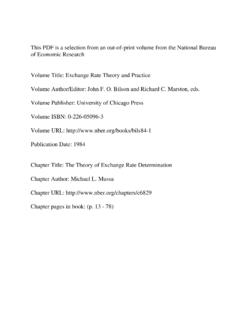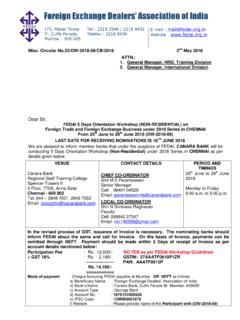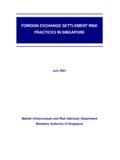Transcription of Impact of Foreign Exchange rate on stock prices
1 IOSR Journal of Business and Management (IOSR-JBM) e-ISSN: 2278-487X. Volume 7, Issue 3 (Jan. - Feb. 2013), PP 45-51 45 | Page Impact of Foreign Exchange rate on stock prices Maheen1 jamil , 2Mr Naeem Ullah 1(Management Sciences, Foundation University Institute of Engineering & Management Sciences, Pakistan) Abstract: Foreign Exchange fluctuations have been found in the literature review to have an Impact on the stock market return and the fluctuations in the stock prices .
2 This research uses the cointegration technique to analyze the Impact of USD to PKR Exchange rate on the stock return market in Pakistan. The stock market return has been studied by KSE 100 Index. The results show that a relationship between the two variables exists in the short run in Pakistan. Keywords Exchange Markets, stock prices , Pakistan I. Introduction stock market return is one of the most relevant and most important metric for the management and the shareholders of the organizations. The study on the factors that Impact the share prices is flocking the research databases mostly because the theorist and the applicants want to optimize the management processes and thus provide a guaranteed and stabilized performance of the stock .
3 One factor that impacts the return on stocks and the interest of investors in the stock is the Foreign Exchange rate. Foreign Exchange return is also important in the context of macroeconomic management of a country meaning to say that if a relationship between the Foreign Exchange rate and the stock market return is found to exist, then the government has the opportunity to manage the Exchange rate and thus the return on the stock market. Moreover, through the establishment of this relationship, the investors will be able to get another element of predictability in the fluctuations of stock market returns.
4 II. Literature Review As far as the existence of literature on market returns and forecasting stock returns is concerned, the amount is found to be considerably high (Ferreira and Santa-Clara, 2011). A number of factors have been of interest when it comes to forecasting stock market return for example the macroeconomic variables, the corporate actions and finally the measure of risk and the studies find that there is a predictable component in stock market return that the investors can find and use to stabilize their returns to a greater extent.
5 Certain critique however exists to the researches and the forecasting models that exist. For example Goyal and Welch (2008) studied the out of sample performance of a list of apparent predictors of stock market return and find the historical mean to have a better out of sample performance in predicting the stock market returns than the traditional regressions used for forecasting purposes. So what Goyal and Welch (2008) are saying is that the use of traditional predictive regression models would not have helped the investor in either attaining valuable information regarding the stock return patterns or to make profits on time.
6 Bermer and Hiraki (1999) say that there has been a lot of interest shown by interest to know whether there exists a predictable component in the short term stock return or not. One of the reasons for this interest is that the researchers want to either confirm or reject the assumed rationality of individual investors and the efficiency of the stock market. Those who do have faith in the rationality of investors and efficiency of the market, seek to study the short term return patterns of the stock in order to give evidence on the subtle market microstructure issues.
7 For the purpose of assessing the expected returns, uncertain changes in the investment opportunity have been found to play a strong role in ascertaining the demand of the asset by the potential investors (Cox, Ingersoll and Ross, 1985). In this regards, Chiang and Doong (1999) says that financial volatility is a factor that needs to be considered significantly for exaplining the stock returns. III. Exchange Rate As far as quantifying the expectation of the Exchange rate are concerned, Marey (2004) says on the basis of a survey data that long term expectations are not only heterogeneous but are also not effectively described by the rational expectations.
8 In his own research, Marey (2004) tried to investigate the level of plausibility of standard Exchange rate expectations mechanism which in an artificial economy are found to be favored by heterogeneous traders, the research concludes that adaptive expectations market exhibits more serial correlation because it bandwagons the expectations market. Secondly, the extrapolative expectations market The perceived Impact of corporate social responsibility on credit rating company 46 | Page sometimes generates extreme returns and thus cannot be empirically plausible and finally, the regressive expectations market reproduces stylized facts of empirical quarterly Exchange rates.
9 Tsen (2011) says that the real Exchange rate has been found to play an important role in the investment determination and the international trade systems as the appreciation of real Exchange rate can lead to retarded exports, a change in the amount of debt payment that needs to be done and a growth of inflow of Foreign direct investment. The economies overall can be affected by the changes in the Exchange rate. For this research however, the Impact of Exchange rate changes on the stock returns has been considered. IV.
10 The Impact of Exchange Rate Changes on the stock Returns The relationship with the US dollar and the stock Exchange Index has been studied by Wu et al (2012) who have focused their research on the Philippine stock Exchange . According to the authors, such a research can actually help in guiding the government of countries to macro manage the investor returns on the stocks and thus in effect control the inflow of Foreign direct investment into the country. Focusing further on the issue, Bahani-Oskooee and Sohrabian (2006) use the granger causality technique along with the co integration technique to analyze the results of Exchange rates and stock prices by using the S&P 500 index.
